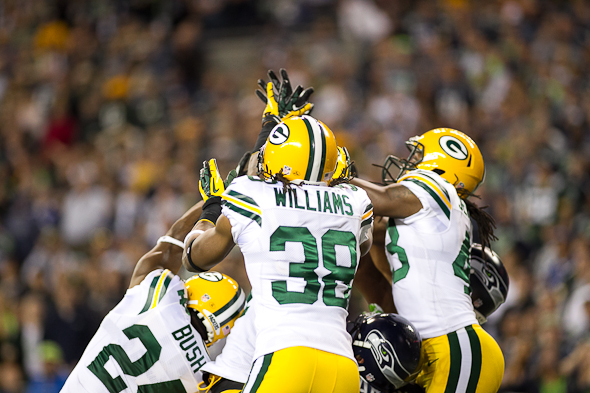
Once I saw mock photo of Jon Stewart during the first segment of “The Daily Show” Wednesday wearing a Marshawn Lynch jersey and no pants — butt pixelated from the TV audience — I knew the Seahawks Fail Mary play Monday night had gone immortal.
Or immoral. I mix up those two words sometimes.
The segment was taped before the settlement was announced late Wednesday between the NFL and the referees association, so the show mocked up a progess report from outside NFL headquarters in New York using a replacement correspondent — Shakespearean actor Patrick Stewart (for the nerds: Capt. Jean-Luc Picard) instead of regular John Oliver.
It was a howler, which you can see from the link above. The point was that Jon Stewart liked the replacement correspondent better than the regular correspondent.
Which is, of course, the exact point missed by the NFL, which could not see beyond its pomposity or around its hubris to understand that its consumers and employees did not think the referee replacements were better, or even minimally less good.
The owners and their front man, commissioner Roger Goodell, knew so little about their own product and cared even less about their consumers that the bosses for months thought they could get away with it. Only until they had their pants pulled down (brilliant analogy, Jon S.) on the most popular show on television — one they invented 40 years ago — by the Seahawks and Tategate, did the notion begin to form that they actually were offering the worst commercial-product idea since the adobe submarine.
By now, you have read about the rage in the Wisconsin dairyland, the rebuke from the White House and the $300 million that changed hands among gamblers after the favored Packers lost a game they actually won on the field. The football consequences from one game will resonate throughout the season because the final-play, perverted outcome likely will alter the playoff field — although truthfully, many more were warped less overtly by incompetent officiating.
But beyond football, there is a cultural subplot at work that gave the refs-vs.-NFL story such resonance that even the TV-free Amish probably have a take:
The eroding appreciation for value.
The reckless removal over a relative pittance of 121 men who spend immense time caring about the quality of their work is a metaphor for any worker, manager, corporate exec, spouse, parent, sibling, student or house pet who has been ignored, denigrated, marginalized, outsourced, furloughed, riffed or right-sized because their contribution was judged irrelevant.
The episode became bigger than a game outcome, or a sports issue, or a labor-management tiff because we are in a time of economic decay when hard work, experience and a belief in a greater communal purpose are values deemed too often expendable in favor of fewer, faster and cheaper.
The particulars of this conflict and its resolution are parsed elsewhere online, and the reader is free to pick a side. But the overarching theme should be indisputable to all parties: If a good thing is done well, all benefit. If a good thing is compromised, all are damaged.
Unlike most such disputes involving cutbacks, the NFL is in no financial jeopardy — at least none except by its own hand. The owners simply slammed the door because they believed they could; as veteran referee Jerry Markbreit put it after he was fired in June: “They said, ‘We’re the NFL. Nobody tells us no.'”
Also unlike most disputes, the consequences played out to the world in ways easily discernible to sports fans, and many non-sports fans. It wasn’t like a replacement worker in Chengdu mis-aligning a chip in an iPhone, it was a replacement worker calling a phantom pass-interference penalty on Kam Chancellor . . . OMG! What are you clowns doing?!
The preposterousness of the NFL’s premise and the visibility of the decision’s consequences made for a stark exposure of the diminution of value.
I heard from some readers that a union of part-time workers can’t expect compensation and benefits usually reserved for full-time workers or management. That misses another point about this particular dispute: The referees are, by ownership’s choice, its guardians of outcome integrity and player safety, only the two most important tasks in the industry. Owners make rules and policy, and players play, but only the referees enforce standards and create trust. No group in the industry has greater responsibilities.
The work isn’t a commodity task up for bid like janitorial services. The work is highly specialized requiring unusual training and experience.
Yes, the part-time work is well compensated, relatively, up to $150,000 annually. But the Thursday-Sunday workload is fierce and the scrutiny intense: How would you like 13 live TV cameras trained on your work day?
To make a stand built on arrogance instead of need, the NFL could not have picked on a more valuable group at a worse time in the economic culture of the nation. The Packers paid the most notable price, but many others took hits too.
But now it’s resolved. Sports fans will soon be back to booing the refs, and anyone robbed by a call will be said to have been “Tated.” But the resolution of the subplot carries more weight: A win for value and quality.
